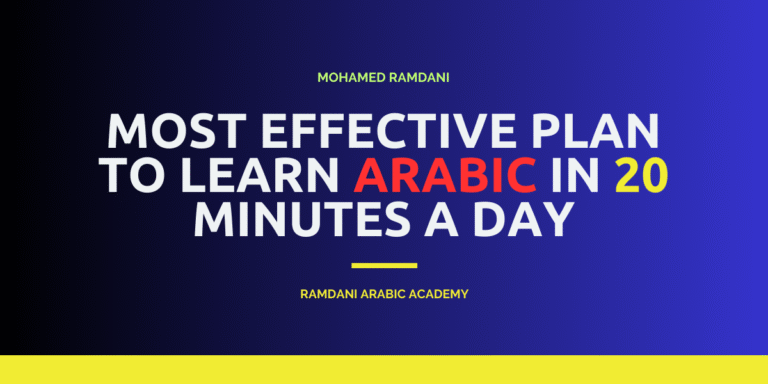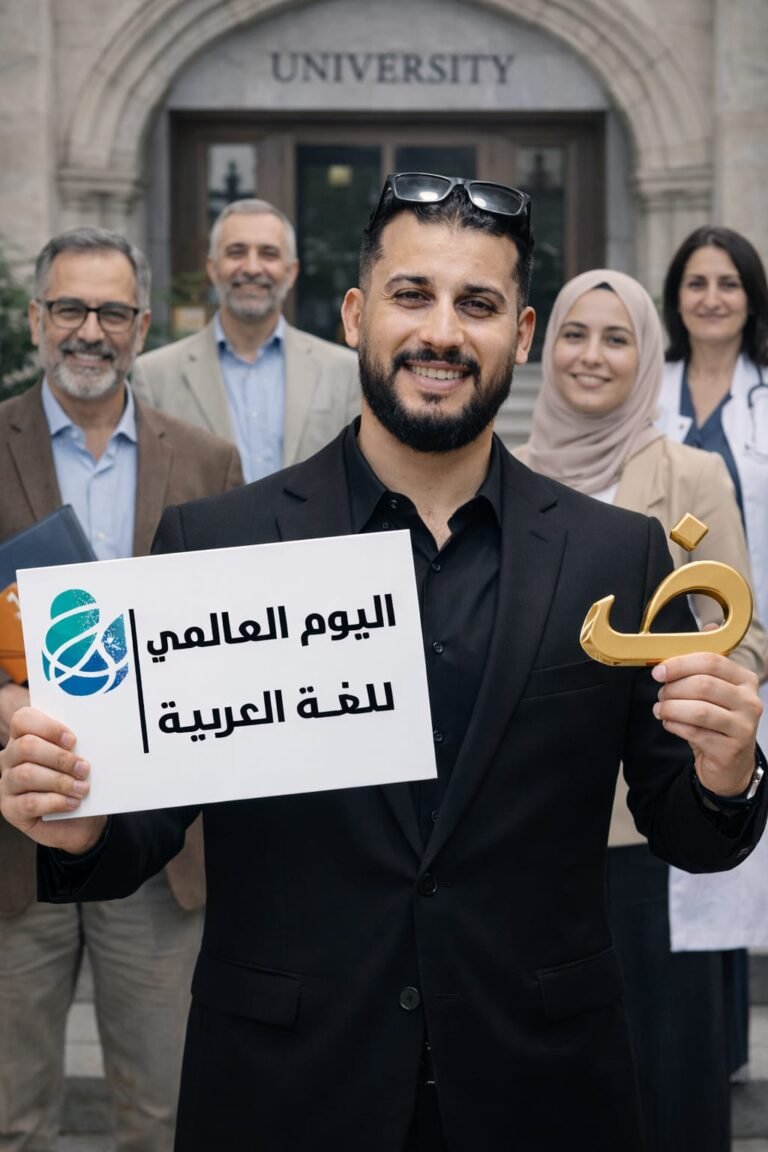Can I learn Arabic in 2 months? Best Answer
Every learner asks the same question before starting a new language. How long will it take me to speak it? If you are reading this, you are probably wondering if two months is enough to learn Arabic. This is a fair question. You want to know if the time and energy you invest will give you results you can feel proud of.
Arabic has a reputation for being difficult. People often hear that it is one of the hardest languages for English speakers. Its alphabet looks different. The words sound different. The grammar is not like what you know. That might scare you. But it should not stop you. The truth is that Arabic is not impossible. You can make progress in a short time if you have a clear plan, good materials, and strong motivation.
Let’s talk about what “learning Arabic” means first. Learning a language is not one single skill. You must learn to listen, speak, read, and write. You must also build vocabulary and understand grammar. You will not master all of this in two months, but you can reach a level where you feel confident in basic communication. You can greet people, introduce yourself, ask simple questions, and understand common phrases.
Your goal matters. If you want to speak with friends when you travel, you can focus on spoken Arabic. You can learn common expressions, polite phrases, numbers, and key words. If you want to read the Qur’an, you can focus on Modern Standard Arabic and reading skills. If you want to work in a job that needs Arabic, you may need more time to reach a professional level. Two months can give you a strong start, but it is not enough to become fluent.
The way you study matters even more. If you practice every day, even for 30 minutes, you will progress faster than someone who studies once a week. Daily contact with the language is key. Repetition builds memory. Speaking out loud builds confidence. Listening trains your ear to new sounds. Reading trains your eyes to recognize the letters. Writing trains your hand to move naturally.
Another point to remember is that Arabic has many dialects. Egyptian Arabic, Levantine Arabic, Gulf Arabic, and others are used in daily life. Modern Standard Arabic is used in books, news, and formal speech. You must choose which one fits your goal. Learning a dialect helps you speak with people. Learning Modern Standard Arabic helps you read and write. Some learners mix both to get the best of each.
This article will guide you through what you can achieve in two months, what methods work best, and what realistic expectations you should have. You will see that two months can transform your understanding of Arabic if you use your time well.

Part 1 – What You Can Realistically Achieve in Two Months
Two months is a short time, but it is enough to make visible progress. You will not speak like a native, but you can build a strong base that will carry you forward. What matters is to set goals that fit the time you have.
Start with the alphabet. In your first week, focus only on learning how to read and write Arabic letters. There are 28 letters. Each one has four shapes depending on its position in the word. At first this looks confusing, but after daily practice, it becomes easy. Most learners can recognize all the letters after 7 to 10 days.
Once you know the letters, focus on pronunciation. Arabic has sounds that do not exist in many other languages. Sounds like ع (‘Ayn), ق (Qaf), and ح (Ha) need extra practice. Listen to recordings and repeat until you feel comfortable. Good pronunciation early helps you avoid bad habits later.
Vocabulary is your next step. Learn words that you can use every day. Start with greetings like السلام عليكم (peace be upon you) and كيف حالك (how are you). Learn pronouns, numbers, days of the week, and common verbs like go, eat, drink, and want. With 20–30 words per week, you can have a vocabulary of 150–200 words after two months.
Grammar is important but keep it simple at first. Learn how to form basic sentences like “I am Mohamed” (أنا محمد) or “I want tea” (أريد شاي). Learn how to ask yes/no questions. Learn the difference between masculine and feminine words. Do not try to master advanced grammar in two months. You can add that later when you feel comfortable.
Listening should be part of your daily routine. Play short Arabic clips, even if you do not understand everything. Your brain will get used to the rhythm of the language. Watch children’s cartoons in Arabic. They use simple words and clear pronunciation.
Speaking is the most important skill to practice every day. Even if you speak to yourself, do it out loud. Say what you see around you. “This is a book.” “I am writing.” “I am drinking coffee.” This builds confidence. If possible, speak with a teacher or language partner online at least twice a week.
By the end of two months, if you follow this plan, you should be able to:
- Read and write all Arabic letters
- Pronounce most sounds correctly
- Use 150–200 common words
- Form simple sentences and questions
- Understand slow, basic speech on familiar topics
- Introduce yourself and have short exchanges
This is a realistic goal for a motivated learner. It will not make you fluent, but it will give you a solid foundation to build on.

Part 2 – Effective Learning Strategies and Daily Routines
Consistency is the most important factor in your success. Many learners start with energy but stop after a few weeks. You must treat Arabic like a daily habit. Think of it as part of your day, not something extra.
Create a study plan that you can follow every day. Two months is short, so every day counts. Divide your time into small sessions to keep your mind fresh. Here is a sample routine you can follow if you have one hour each day:
- 10 minutes – Alphabet and reading practice
Read simple words out loud. Copy them by hand to improve your writing. - 10 minutes – Vocabulary review
Use flashcards. Test yourself on yesterday’s words. Add a few new ones. - 15 minutes – Listening practice
Play a short audio or video clip in Arabic. Repeat after the speaker. Focus on sounds, not meaning. - 15 minutes – Speaking practice
Talk about your day. Say sentences about what you are doing. Use a mirror if you are alone. - 10 minutes – Grammar basics
Learn one rule at a time. Practice by making your own examples.
This simple routine keeps you active in all skills without feeling heavy. If you have more time, double your sessions or add extra speaking practice.
Use the right tools. Flashcards help you remember words. Apps like Anki or Quizlet use spaced repetition, which is proven to improve memory. For listening, YouTube channels for beginners or Arabic podcasts with transcripts are very useful.
Find a teacher or partner to practice with. Speaking to a real person forces you to use what you learn. It also shows you what you still need to improve. If you cannot find someone locally, online tutors are easy to find.
Immersion speeds up progress. Change your phone language to Arabic. Label objects in your house with sticky notes in Arabic. Play Arabic music in the background while you cook or clean. This keeps the language in your mind all day.
Keep track of your progress. Write a short journal in Arabic every week. Even if it is three sentences, it shows you how far you have come. When you feel stuck, read your first entries and see your improvement.
Avoid common mistakes. Do not try to memorize long grammar tables too soon. Do not jump between too many books or apps. Stick to one main resource and finish it. Do not skip speaking practice because you feel shy. Mistakes are part of learning.
Finally, protect your motivation. Two months is short but intense. Remind yourself why you started. Picture yourself having your first simple conversation in Arabic. That small success will give you energy to keep going.

Part 3 – Challenges, Myths, and Staying Motivated
Every learner faces obstacles. Some give up because they believe they are not talented or that Arabic is too hard. Knowing the common challenges helps you prepare for them and keep going.
The first challenge is the script. Arabic letters look different from what you know, and they connect in different ways. Many learners feel slow when reading at first. This is normal. With daily practice, your reading speed improves within weeks.
The second challenge is pronunciation. Arabic has deep throat sounds and emphatic consonants that do not exist in many languages. At first you may feel strange making these sounds. Record yourself and compare with native speakers. This will show you where you need more work.
The third challenge is grammar. Arabic grammar is logical but detailed. Beginners often get stuck trying to understand all the rules at once. Focus on simple patterns. Learn how to make short sentences. Complex grammar can wait until later.
Another challenge is the choice between Modern Standard Arabic and dialects. Some learners feel lost because there are many versions of Arabic. Decide based on your goal. If you want to speak with people in daily life, choose one dialect and stick with it. If your goal is reading and formal writing, focus on Modern Standard Arabic. You can always add a dialect later.
There are also many myths about learning Arabic. Some people say you need years before you can say a single correct sentence. This is not true. You can speak from day one using simple phrases. Others say you must live in an Arab country to learn well. This is also false. With online resources, teachers, and media, you can create your own immersion anywhere.
Motivation is what keeps you moving when learning feels hard. The first few weeks are exciting because everything is new. Then progress feels slower. This is the point where many people quit. To stay motivated, celebrate small wins. When you learn to write your name in Arabic, be proud. When you understand a sentence in a song or movie, write it down.
Join a community of learners. Share what you learn. Ask questions. Seeing others struggle and succeed reminds you that you are not alone.
Take breaks when needed. Some days you will feel tired. Do not force yourself to study for hours. Even five minutes of review is better than nothing. This keeps your habit alive.
Remember why you started. Write your goal on paper and put it where you see it every day. “I want to speak Arabic with my friends.” “I want to read the Qur’an.” “I want to work in an Arabic-speaking country.” Reading this every day will keep your focus sharp.

Part 4 – Practical Two-Month Study Plan
Having a clear plan removes guesswork and keeps you consistent. Here is a simple eight-week roadmap you can follow. Adjust the pace if you have more or less time each day.
Week 1 – Learn the Alphabet
- Learn 4–5 letters per day
- Practice writing them in all positions (start, middle, end)
- Listen to audio of each letter’s sound
- Start reading very simple words like باب (door) and بيت (house)
- Say each letter out loud until you are comfortable
Week 2 – Connect Letters and Build Simple Words
- Practice connecting letters into words
- Learn the short vowels (a, i, u) and how they change pronunciation
- Start reading 2–3 letter words daily
- Begin learning greetings and polite phrases
- Practice saying your name and asking others for theirs
Week 3 – Master Pronunciation and Add Core Vocabulary
- Focus on difficult sounds like ع, ق, ح, and ط
- Learn 20–30 basic nouns and verbs you can use every day
- Practice saying sentences like “I want water” (أريد ماء)
- Begin short listening exercises (1–2 minutes)
Week 4 – Build Basic Sentences
- Learn pronouns and how to form simple present tense sentences
- Learn yes/no questions and answers
- Continue daily listening practice with slow clips
- Speak out loud every day, even alone
- Review everything from weeks 1–3
Week 5 – Expand Vocabulary and Listening
- Learn words for family, food, and common places
- Start listening to children’s shows or simple dialogues
- Repeat what you hear out loud
- Write 3–4 simple sentences in a notebook each day
Week 6 – Practice Small Conversations
- Learn how to ask and answer basic questions
- Practice ordering food, asking for prices, giving directions
- Speak with a teacher or partner at least twice this week
- Keep reviewing past vocabulary so you do not forget
Week 7 – Improve Reading and Writing Speed
- Read short passages daily, even if you need to look up words
- Write short paragraphs about your day
- Learn 30–40 more useful words for travel, work, or hobbies
- Increase speaking practice to 15 minutes per day
Week 8 – Prepare for Real Conversations
- Practice full dialogues (greetings, introductions, shopping)
- Focus on listening comprehension for common phrases
- Review all grammar points you have learned
- Record yourself speaking and compare with native speakers
- Plan how you will continue learning after two months
Following this plan step by step gives you structure and measurable progress. You will be able to read, write, and have short conversations by the end of the two months if you stay consistent.

Final Advice
Two months is enough to change the way you see Arabic. You will not become fluent, but you will build a foundation that makes future learning easier. The key is to stay consistent and practice every day, even for a short time.
Focus on the basics first. Learn the alphabet, core vocabulary, and simple grammar. Speak out loud every day. Listen to Arabic as much as possible. Write short sentences often. Small, regular steps will give you better results than long, rare study sessions.
Be patient with yourself. Everyone makes mistakes. Each mistake is part of the process. Measure your success by the progress you make, not by perfection. Celebrate when you can read a new word or hold a short conversation.
If you need support, structure, and guidance, you do not have to do it alone. At Ramdani Arabic Academy, we help learners around the world reach their Arabic goals through lessons, courses, and practical materials. We focus on making learning simple and clear so that students can use Arabic in real life.
My name is Ramdani Mohamed, founder of Ramdani Arabic Academy. I have worked with many students who started as complete beginners and saw results in weeks when they followed a clear plan. I believe that anyone can learn Arabic if they have the right resources and the right mindset.
If you are serious about starting, visit our website and explore our courses. We have programs for beginners, intermediate learners, and advanced students. You can also read our articles and tips to keep your motivation strong.
Your two-month journey can be the start of something bigger. Take the first step today. Open your notebook, write the Arabic alphabet, say the first few letters out loud, and start building the habit. In eight weeks, you will look back and see how far you have come.







